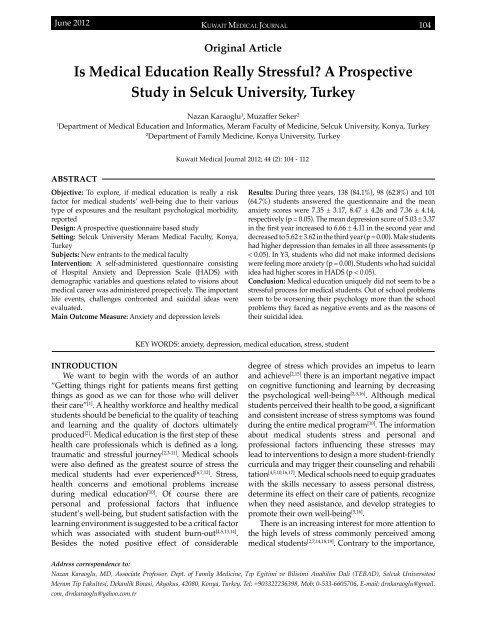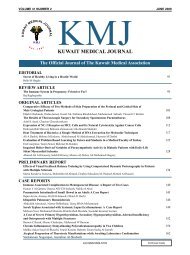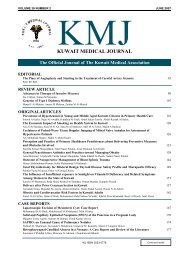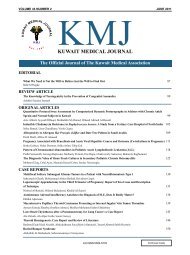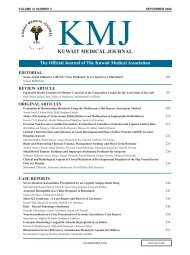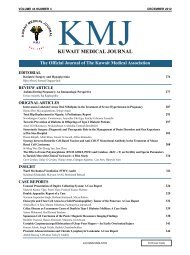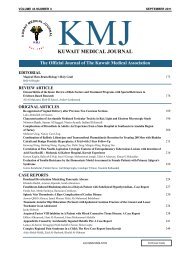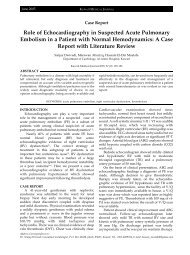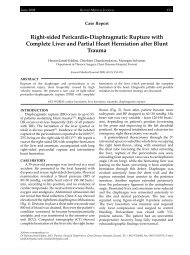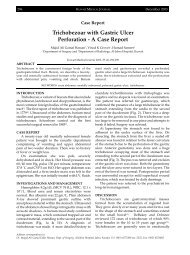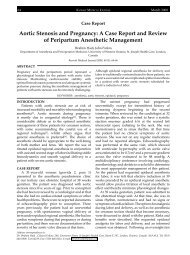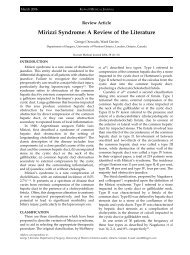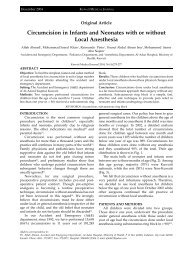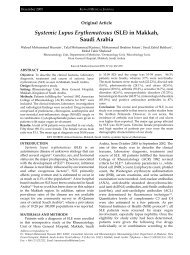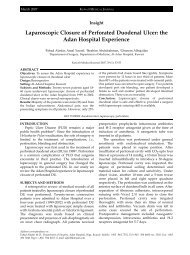Vol 44 # 2 June 2012 - Kma.org.kw
Vol 44 # 2 June 2012 - Kma.org.kw
Vol 44 # 2 June 2012 - Kma.org.kw
You also want an ePaper? Increase the reach of your titles
YUMPU automatically turns print PDFs into web optimized ePapers that Google loves.
<strong>June</strong> <strong>2012</strong><br />
KUWAIT MEDICAL JOURNAL 104<br />
Original Article<br />
Is Medical Education Really Stressful? A Prospective<br />
Study in Selcuk University, Turkey<br />
Nazan Karaoglu 1 , Muzaffer Seker 2<br />
1<br />
Department of Medical Education and Informatics, Meram Faculty of Medicine, Selcuk University, Konya, Turkey<br />
2<br />
Department of Family Medicine, Konya University, Turkey<br />
Kuwait Medical Journal <strong>2012</strong>; <strong>44</strong> (2): 104 - 112<br />
ABSTRACT<br />
Objective: To explore, if medical education is really a risk<br />
factor for medical students’ well-being due to their various<br />
type of exposures and the resultant psychological morbidity,<br />
reported<br />
Design: A prospective questionnaire based study<br />
Setting: Selcuk University Meram Medical Faculty, Konya,<br />
Turkey<br />
Subjects: New entrants to the medical faculty<br />
Intervention: A self-administered questionnaire consisting<br />
of Hospital Anxiety and Depression Scale (HADS) with<br />
demographic variables and questions related to visions about<br />
medical career was administered prospectively. The important<br />
life events, challenges confronted and suicidal ideas were<br />
evaluated.<br />
Main Outcome Measure: Anxiety and depression levels<br />
Results: During three years, 138 (84.1%), 98 (62.8%) and 101<br />
(64.7%) students answered the questionnaire and the mean<br />
anxiety scores were 7.35 ± 3.17, 8.47 ± 4.26 and 7.36 ± 4.14,<br />
respectively (p = 0.05). The mean depression score of 5.03 ± 3.37<br />
in the first year increased to 6.66 ± 4.11 in the second year and<br />
decreased to 5.62 ± 3.62 in the third year (p = 0.00). Male students<br />
had higher depression than females in all three assessments (p<br />
< 0.05). In Y3, students who did not make informed decisions<br />
were feeling more anxiety (p = 0.00). Students who had suicidal<br />
idea had higher scores in HADS (p < 0.05).<br />
Conclusion: Medical education uniquely did not seem to be a<br />
stressful process for medical students. Out of school problems<br />
seem to be worsening their psychology more than the school<br />
problems they faced as negative events and as the reasons of<br />
their suicidal idea.<br />
KEY WORDS: anxiety, depression, medical education, stress, student<br />
INTRODUCTION<br />
We want to begin with the words of an author<br />
“Getting things right for patients means first getting<br />
things as good as we can for those who will deliver<br />
their care” [1] . A healthy workforce and healthy medical<br />
students should be beneficial to the quality of teaching<br />
and learning and the quality of doctors ultimately<br />
produced [2] . Medical education is the first step of these<br />
health care professionals which is defined as a long,<br />
traumatic and stressful journey [2,3-11] . Medical schools<br />
were also defined as the greatest source of stress the<br />
medical students had ever experienced [6,7,12] . Stress,<br />
health concerns and emotional problems increase<br />
during medical education [10] . Of course there are<br />
personal and professional factors that influence<br />
student’s well-being, but student satisfaction with the<br />
learning environment is suggested to be a critical factor<br />
which was associated with student burn-out [4,5,13,14] .<br />
Besides the noted positive effect of considerable<br />
degree of stress which provides an impetus to learn<br />
and achieve [2,15] there is an important negative impact<br />
on cognitive functioning and learning by decreasing<br />
the psychological well-being [2,3,16] . Although medical<br />
students perceived their health to be good, a significant<br />
and consistent increase of stress symptoms was found<br />
during the entire medical program [10] . The information<br />
about medical students stress and personal and<br />
professional factors influencing these stresses may<br />
lead to interventions to design a more student-friendly<br />
curricula and may trigger their counseling and rehabili<br />
tation [4,5,10,16,17] . Medical schools need to equip graduates<br />
with the skills necessary to assess personal distress,<br />
determine its effect on their care of patients, recognize<br />
when they need assistance, and develop strategies to<br />
promote their own well-being [5,16] .<br />
There is an increasing interest for more attention to<br />
the high levels of stress commonly perceived among<br />
medical students [2,7,14,18,19] . Contrary to the importance,<br />
Address correspondence to:<br />
Nazan Karaoglu, MD, Associate Professor, Dept. of Family Medicine, Tıp Egitimi ve Bilisimi Anabilim Dali (TEBAD), Selcuk Universitesi<br />
Meram Tip Fakultesi, Dekanlik Binasi, Akyokus, 42080, Konya, Turkey. Tel: +903322236398, Mob: 0-533-6605706, E-mail: drnkaraoglu@gmail.<br />
com, drnkaraoglu@yahoo.com.tr


